|
|
Post by delon on Jul 6, 2019 15:42:05 GMT
Comments/ratings/recommendations/film posters are welcome and much appreciated.
|
|
|
|
Post by politicidal on Jul 6, 2019 15:58:15 GMT
The Devil's Disciple (1959) 5/10
The Librarian: The Curse of the Judas Chalice (2008) 6/10
Bugsy (1991) 8/10
The Big Heat (1953) 7/10
Fighting with My Family (2019) 7/10
Wolf (1994) 6/10
|
|
|
|
Post by wmcclain on Jul 6, 2019 16:01:32 GMT
|
|
|
|
Post by vegalyra on Jul 6, 2019 16:53:59 GMT
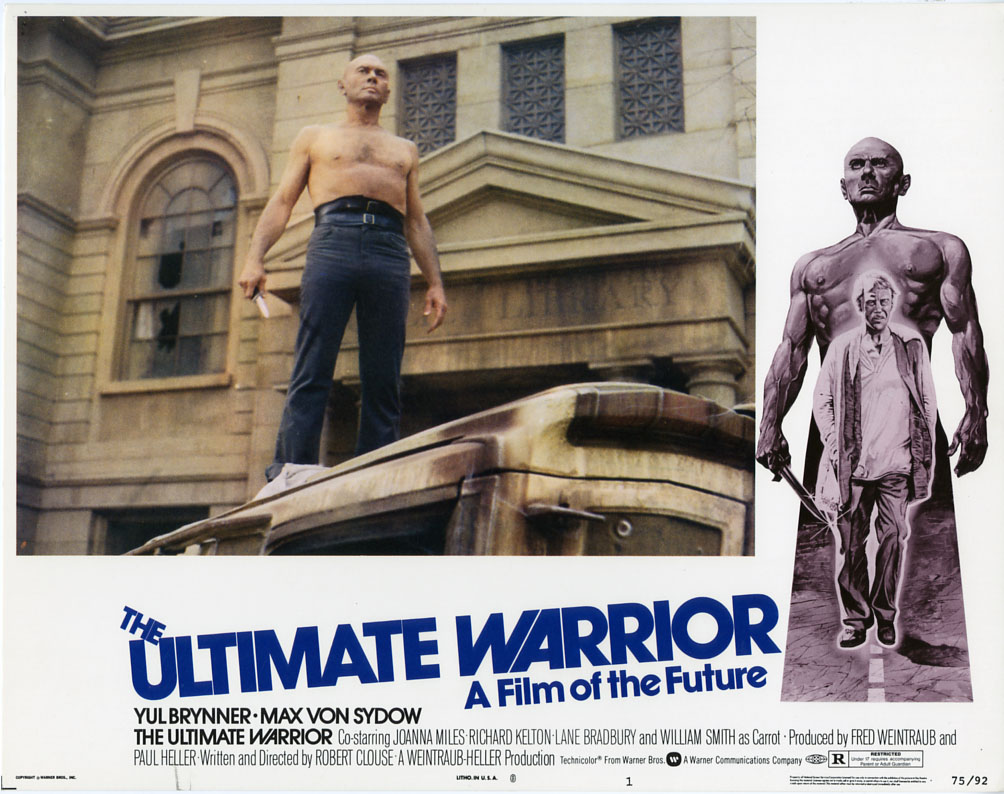 The Ultimate Warrior (1975) Very well done post apocalyptic film that I hadn't seen before, Yul Brynner and Max Von Sydow did a wonderful job (as usual). The film fits a typical film of this type, as humanity is on its last legs and food is running out (Brynner mentions at some point that while he was in Detroit that people are starting to eat other people). Brynner is a warrior for hire making his way to an island off the shore of North Carolina that is supposed to still be peaceful and has a food supply (and some of his family is reputed to still live there). He stops in NYC where an ongoing conflict between the Commune run by Von Sydow aka "the Baron", leads a somewhat peaceful and peace loving community of survivors in a sealed off block of the city against a rampaging gang of killers led by "Carrot" (William Smith) that hold up in a nearby jail. The Baron convinces Brynner to join his side with a promise of double rations and a dry room without rats. Brynner accepts but lets the Baron know that its a temporary situation as he is on his way to the mentioned island. The Baron has an agricultural scientist (or maybe just a farmer, I'm not exactly sure) that has been able to raise a crop of vegetables on the roof of a building within the commune that is resistant to disease that has apparently wiped out most of the food supply during the war (I assume it was biological warfare or maybe chemical as later scenes show skeletons with gas masks on). The scientist (named Cal) apparently is going to have a baby with his wife who happens to be the Baron's daughter. He also has managed to get a collection of seeds that have the disease resistant strain which he entrusts to the Baron. Cal eventually is killed when confronting some of Carrot's men that have pillaged his current crop. The Baron convinces Brynner to leave the Commune with the seeds along with his pregnant daughter. Carrot learns about the escape plan and the seeds via a turncoat from the Commune's population and chases after the pair in the remains of the NYC subway system. The final battle between Carrot and the Ultimate Warrior is intense and the film is actually pretty smart and well done for what is presumably a fairly moderate budget film. Definitely recommended.  Battle Beneath the Earth (1967) One of the sillier films I've seen in awhile, the film definitely reminds me of those films that used to regularly play on Saturday mornings on the local UHF stations back in the '80s (probably '70s too but I was too young to remember that). Apparently a rogue band of Communist Chinese soldiers have invented a laser boring machine that is capable of tunneling quickly and easily through the earth's crust and has managed to make its way under the Pacific Ocean to the United States to plant atomic weapons under key American cities. A scientist has been studying underground vibrations that weren't typical mine operations and is arrested by the local Las Vegas police for disturbing the police (the film opens with him making a scene near all the casinos by keeping his ear to the ground and yelling loudly "they are under us already, these ants!" He ends up in the local mental asylum but is friends with Kerwin Mathews who works for US Naval Intelligence. Apparently the military has been dealing with some odd coincidences of seismic disturbances and Mathews had been the lead on a naval project with deep sea submersibles, one of which was destroyed by falling underwater rocks caused by seismic activity. The activities by the Chinese draw attention to an old abandoned mine which Mathews is tasked with investigation and an odd Chinese medallion is found along with a passage underground that is too perfectly cut to have been done by conventional methods. Eventually the Chinese are discovered and the scientist that was arrested at the beginning is tasked by the US government to develop a way to detect where all the Chinese boring activities are occurring and also to develop a laser boring machine as well to find the main passage to the single tunnel that the Chinese dug that runs under the Pacific Ocean. Mathews leads another team (after having disarmed quite a few of the atomic bombs) including a beautiful local geologist (who doesn't know not to step on hot molten rocks) to locate the main passage and after some Chinese induced hypnotism and most of his team getting killed manage to destroy most of the Chinese forces underground and set off an atomic bomb that destroys the passage and ends the threat to the US. The film ends with a nuclear blast going off in the distance and Kerwin Mathews and the beautiful geologist sitting outside of a cave entrance viewing the blast. A silly film, but the story is fun enough and the acting played so straight that it's worth a late night view.  Waiting (2005) Not much to say about this film, just another dumb '00s era gross out comedy but noteworthy just because the story parallels my experience with friends that worked in the restaurant industry at roughly the same time period (just a little before in the late '90s). The restaurant is definitely modeled after Beningans restaurants that used to proliferate the Houston area (and I assume most of the US). I remember my friends making a pretty good sum of money on Friday and Saturday nights and blowing most of the tips they earned on weed and alcohol which is definitely evident in this movie. It was also a pretty tight group and outside friends weren't usually allowed at their regular parties held after the close of their shifts on Saturday nights (evidenced by Ryan Reynolds' comment to Justin Long near the end of the film after Long quits the restaurant "You've been replaced!"). The waiters and waitresses regularly dated each other and this is also shown in the film. It's definitlely true to life. The film wouldn't be made today (in the same fashion) I don't think, especially because of all the jokes used during the "game" where if a co-worker (male) sees another male's privates and he's called a "fag" and kicked in the bottom depending on the complexity of the pose of the other male's privates. A pretty dumb film, but some of the jokes grab a laugh, and the "art imitates life" saying definitely applies here.  The 40 Year Old Virgin (2005) Only watched this one because the wife wanted to see it. I'm not a big fan of this movie, I saw it when it came out and it relies on the same gross out jokes and sex references that Judd Apatow is (in)famous for.
|
|
|
|
Post by teleadm on Jul 6, 2019 17:51:04 GMT
This is my groovy week:  Entertaining slam-bang action, done when Bruce Willis was still a fresh name. You can't hold a good man down, even in a dirty undershirt.  A bit over the top, with nice Japanese locations, Macchio and Morita's charm carries this a long way, the story is a bit too trite. Compared to what was to follow though, this a great movie, but only compared to what was to follow.  OK I got the idea of re-watching this movie again seing sombody else had seen it last week. A very complicated storyline fused together in the expert hands of director John Schlesinger. With great performances by all. Character driven thriller, where nobody can be trusted, and you have to ask yourself "Is it safe?"  The last of the three 1960s French supervillian Fantomas movies, This time taking place in Scotland, a Scotland where everyone speak French. It feels a bit tired, in wich Fantomas blackmails rich people who avoids taxes get's a threat of pay or die, including the French speaking British mob. What is missing is some great sets, and it wastes to much time poking tiresome fun on that old tradition of fox hunts.  Looks like another merry muscal, but it does have a few issues. The last Kelly-Donen collaborations in the directors seat. While there are many delights like Gene Kelly tapdancing on roller skates, and raises interresting questions about friendship and reunions and how people might grow away from each others. I can't help but feeling that there is a certain "it" missing that I've been trying to pinpoint can't find, since it had everything. Still not a waste of time.  This movie I like! Seen it before and it's one of those movie I like to watch from time to time. Character driven thrills. Powerhouse actors that delivers. Bogart and Bacall was a match made in Heaven, they are like two teens checking each others out not saying a word while walking to look after the boats before the hurricane scenes.  Old Austrian movie before the Anschluss, the main reason I watched it was to see Werner Krauss in something else, since I only know him from one movie before as Dr Caligari. Without subtitles and not speaking German, I still found it fascinating. Though I had to pause halfway through and find a synopsis on the net so I could get some hang of it. The story partly reminded of A Double Life 1947. The old confused actor needs guidance from his prompter on the stage and mistakes a woman's invitations like it was in real life. A very different experience. That was my week!  |
|
|
|
Post by teleadm on Jul 6, 2019 17:57:41 GMT
wmcclainI noticed Night Boat to Dublin, is it worth seeking out? It looks and sound interesting.
|
|
|
|
Post by wmcclain on Jul 6, 2019 18:04:14 GMT
wmcclainI noticed Night Boat to Dublin, is it worth seeking out? It looks and sound interesting. I watched it because I figured the title was a play on Night Train to Munich, a very good film. It's just so-so. Low intensity and without much humor. I can't give it a strong recommendation.
|
|
|
|
Post by Doghouse6 on Jul 6, 2019 18:11:41 GMT
 Looks like another merry muscal, but it does have a few issues. The last Kelly-Donen collaborations in the directors seat. While there are many delights like Gene Kelly tapdancing on roller skates, and raises interresting questions about friendship and reunions and how people might grow away from each others. I can't help but feeling that there is a certain "it" missing that I've been trying to pinpoint can't find, since it had everything. Still not a waste of time. I don't know if this will zero in on that "missing" aspect, teleadm, but there's a budget-conscious spareness to the production design that sets it apart from the aesthetic opulence (even garishness, sometimes) of MGMusicals of the '40s, or those even as late as Singin' In the Rain or The Bandwagon in the early '50s. Along with this goes an edgy and bitter cynicism that was thematically uncharacteristic of earlier light and frothy efforts. Although bracketed at the opening and closing by old-fashioned sentiment, that hard edge is among the things I most enjoy about it. And for my money, that roller-skating number, "I Like Myself," has Gene Kelly's other "street dances," from Cover Girl to Singin' In the Rain, beat hands down. Or should I say, "feet?"
|
|
|
|
Post by mikef6 on Jul 6, 2019 18:15:45 GMT
Brother Orchid / Lloyd Bacon (1940). Warner Bros-First National. Edward G. Robinson spoofs his gangster image (as he did several times in the late-‘30s and early-‘40s) as Little Johnny Sarto, a mob boss who takes a vacation but is ousted when he tries to return, thrown out by his former friend and protégé, Jack Buck (Humphrey Bogart) who is now the new leader. When Johnny tries to form a competing mob, Buck and his men try to hit him. Barely escaping but wounded, he takes refuge inside a monastery and learns that not everybody plays all the angles. If this is not quite as funny as it could have been, it is not even close to being as sentimental as it could have been. Robinson’s transformation is never played for mawkishness (we wonder if it is actually going to happen). Further, the religious side is played down. Even though the brothers are obviously Catholic, neither that organization nor Christianity is mentioned. Sarto is told there are no religious vows to keep only to help grow the flowers that sell in the city only to give away to charity any money they make. Donald Crisp is the Brother Superior, Ann Southern is the girlfriend Little Johnny leaves behind, and Ralph Bellamy plays a rich cattle rancher who is in love with Southern. Bogart was going through a period when he was really showing his star power and charisma on screen. “Brother Orchid” was followed by “They Drive By Night” and then “High Sierra.” His next two films were “The Wagons Roll At Night” and “The Maltese Falcon.”  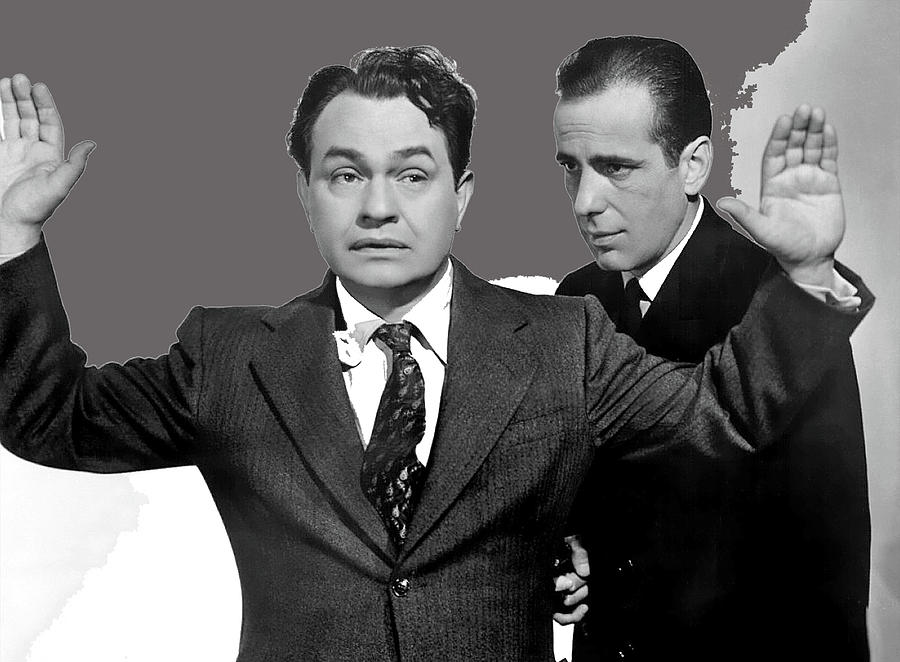 Caged Fury / William Berke (1948) Caged Fury / William Berke (1948). Pine-Thomas Productions / Paramount. Serviceable enough programmer running about an hour. This a circus thriller with romantic lion tamers, treacherous clowns, and a lot of beautiful animals being abused. The stars are young lovers Blaney and Kit (Richard Denning and Sheila Ryan) who develop a lion taming act together when star attraction Lola (Mary Beth Hughes) is killed by the ornery lion, Samson. What nobody knows is that Lola’s death was engineered by the clown Smiley (Larry “Buster” Crabbe) to make way for the promotion of Kit who he loves. It is actually Buster Crabbe in a rare villain role who is the main attraction in the center ring. He is the actor with screen presence and charisma who holds the movie together through a lot of standard fist fights, fires, and car crashes. “Caged Fury” only has 26 votes and one user comment at the database so, if you see this you are among an elite few [sarcasm alert].  The Las Vegas Story / Robert Stevenson (1952) The Las Vegas Story / Robert Stevenson (1952). RKO. A good cast is wasted on a slack story line from the Howard Hughes run RKO Studio. A high spending couple, Lloyd and Linda Rollins (Vincent Price and Jane Russell) are on their way to L.A. but Lloyd decides to stop in Las Vegas and do some gambling. Vegas is where Linda used to live and sing at the Last Chance Casino. Her old flame Dave Andrews (Victor Mature) is now a Lieutenant with the Clark County Sheriff's Department. He is still bitter for being dumped by Linda years ago. About half of the film’s 88 minute run time is taken up by Linda having to deal with Lloyd’s sudden gambling urge and memories of her time with Dave. A murder occurs at about 46 minutes in. The mystery is solved after only 15 minutes and the remainder of the time involves a drawn out car / helicopter chase and shoot-out. The extended action finale was something of a Hughes trademark. Also in the cast is Hoagy Carmichael, Brad Dexter, and Syd Saylor.  The Scarlet Hour / Michael Curtiz (1956) The Scarlet Hour / Michael Curtiz (1956). Paramount Pictures. Revered director Michael Curtiz (The Adventures of Robin Hood, The Sea Wolf, Yankee Doodle Dandy, Casablanca) could tackle successfully just about any genre. In this late film of his (he also produced, the last of only five films where he got that credit), he brings home a typical noir plot (at least on the surface) of a love sick dupe of a man who gets dragged into a crime scheme by a manipulating femme fatale. But there is more going on than is immediately revealed. Pauline (Carol Ohmart) is unhappily married to real estate tycoon Ralph Nevins (James Gregory). She is carrying on a hot affair with her husband’s top seller, “Marsh” Marshall (Tom Tryon). He is head-over-heels for her but Pauline wants a monetary cushion before leaving her husband. While necking in a car on a mountain road one night, the couple overhears some men plotting a jewel robbery at a nearby home of some rich people who are on vacation. Against Marsh’s better judgment, he agrees to pull a hijack and rob the robbers. What could possibly go wrong? Well first, there is a jealous husband who is on their trail. And what about the secretary back at the office (Jody Lawrance) who seems to have a Thing for Marsh? What does she know? And who is the well-dressed gentleman who planned the robbery in the first place? Interesting script full of surprises from three credited writers including Frank Tashlin, better known as a director of comedy films. The only element I feel that could have been bettered are the lead players. This was the film debut of both Ohmart and Tyron. Ohmart attempts to put a little fire into her character even though she can’t quite get there. Tryon, on the other hand, even though his career lasted into the 1970s on his square-jawed classic leading man looks, was always a pretty dull actor. Supporting players Jody Lawrance, James Gregory, and Elaine Stritch show us how it should be done. Recommended late noir from the late output of an important classic film director.  The Big Circus / Joseph M. Newman (1959) The Big Circus / Joseph M. Newman (1959). Irwin Allen Productions / Allied Artists Pictures. My second circus movie of the week and one too many. The setting is contemporary. Henry Whirling (Victor Mature) is one of the last of the big circus entrepreneurs. He needs a loan and investment from a big bank. The bank agrees as long as he accepts a bank account (Red Buttons) and press agent (Rhonda Fleming) to accompany him. He objects strongly but has not choice. During the course of the movie we see many roadblocks to success crop up to threaten Whirling. The weather is a big one but there is the growing suspicion that a saboteur is among his trusted crew (the traitor is not all that hard to spot). The worst work of the hidden villain is a train wreck that causes the death of one half of the world’s most famous high wire act, the wife half of the Flying Colinos, leaving Zach Colino (Gilbert Roland) alone and despondent. Acting, for the most part, is amateurish and obvious, like the stars weren’t even trying (Roland is the best of the bunch and Buttons is not noticeably bad, either). The rest of the cast includes Vincent Price and the Ringmaster, Peter Lorre as Skeeter the Clown and David Nelson (Ozzie and Harriet) as a trapeze performer. There was a personal reason for watching “The Big Circus.” When My Lovely Wife was in her teens growing up in Wisconsin, she and her family attended the ceremonies in Baraboo, Wisconsin surrounding the opening of the Ringling Bros. Circus Museum. Part of the celebration was the premiere of this movie under review. She got in to see the premiere showing. After it was over, and they were getting ready to leave, Rhonda Fleming appeared on the grounds signing autographs. Her father got a couple of good snaps of Fleming, one which had his daughter in the foreground and the actress in the background. Last summer, she got her pictures and story of the movie and museum published in a popular national magazine of nostalgia for old people (I hate the magazine but am very proud of her publishing achievement). She had not seen “The Big Circus” since that day so we took the opportunity to view it together. 13 West Street / Philip Leacock (1962). Ladd Enterprises/Columbia Pictures. Before there was “Death Wish” there was…“13 West Street.” Rocket scientist Walter Sherill (Alan Ladd) is working late because his team is facing a deadline. Driving home in the early morning hours, his car runs out of gas in a lonely industrial area. A car with five teenage boys stop and, for no good reason, beat the crap out of Sherill, breaking one of his ankles in the process. His case is assigned to dogged police detective Sgt. Koleski (Rod Steiger, very natural, never over-the-top) but the wheels of justice are turning too slowly for Sherill, especially when the kids who assaulted him begin to threaten his wife and home, so he investigates on his own, even buying a gun. The film also taps into a current concern with juvenile delinquency and with the myriad of cheap movies that exploited the social issue – except in this film it is the victim who is the main character and the JDs are not disadvantaged but the sons of the very rich and privileged. Alan Ladd, at the time, was thinking of retiring from acting and becoming a full-time producer. He was beginning with this film which came from Ladd’s own company. Unfortunately, Ladd was aging fast due to alcoholism (he looks several years older than his age of 48 at the time of filming) and only had one more film to go – a supporting role in “The Carpetbaggers” (1964) – before his sudden death at the young age of 50. “13 West Street” co-stars are Dolores Dorn as Ladd’s wife (a fairly strong female character) and Michael Callan is the sociopathic leader of the teen gang. 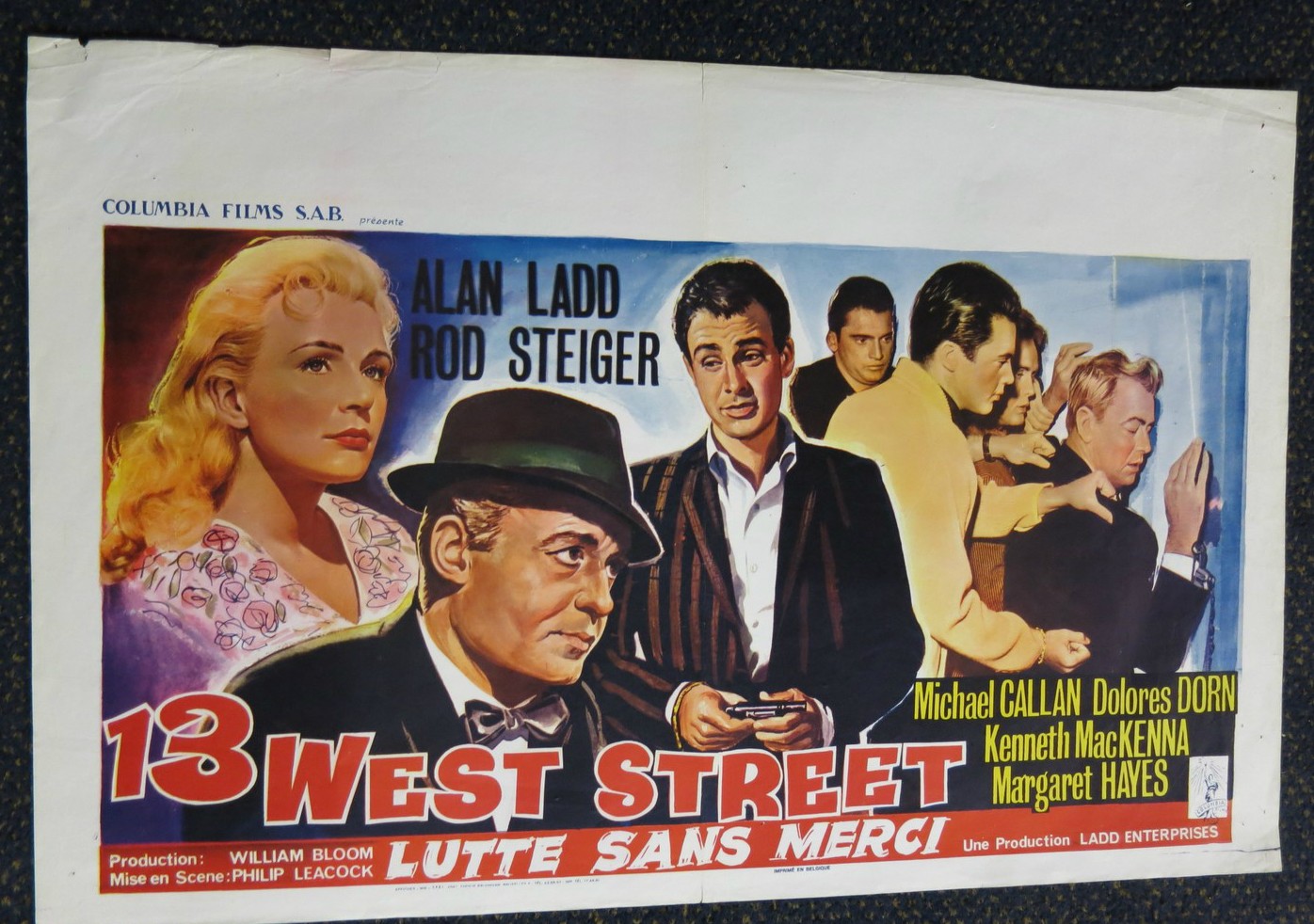 In-Cheon Sang-Ryuk Jak-Jeon (Battle For Incheon: Operation Chromite) / John H. Lee (2016) In-Cheon Sang-Ryuk Jak-Jeon (Battle For Incheon: Operation Chromite) / John H. Lee (2016). CJ Entertainment. Another South Korean film about their recent past wars during which they fought against occupying forces. In this case, the enemy is North Korea and China and the action is the preparation for the invasion by sea of the city of Incheon by United Nations Forces led by Gen. Douglas MacArthur in 1950, an event often thought of as the turning point of the Korean War. The only other film of this invasion is the legendary movie disaster “Inchon” (1981), which I have not had the rare privilege of seeing. A small band of South Korean spies are sent to Incheon posing as security inspectors but whose only goal is to secure a map of the mines that line the harbor. Intense actor Jung-jae Lee (Assassination, New World, The Thieves) poses as a well-known North Korean officer but he can never quite fool the Incheon commander Jae-Sun Han (Se-Yeon Jin) who is always dangerously cheerful and seemingly cooperative. These excellent sequences in Korean are totally undercut by several English language scenes featuring Liam Neeson (who I have lately come to understand is very popular in South Korea) as Gen. MacArthur. To put it bluntly, Neeson is simply awful and his scenes come very close to sinking the entire film. During each of them I was praying for the Lord to either take me home or return to the South Korean actors. I did see one clip from the 1981 “Inchon” of an unrecognizable Laurence Olivier as MacArthur and found him to be just as jaw-droppingly terrible as Neeson. Watch this film but keep your thumb near the fast-forward scan button on your remote. 
|
|
|
|
Post by teleadm on Jul 6, 2019 18:43:25 GMT
Looks like another merry muscal, but it does have a few issues. The last Kelly-Donen collaborations in the directors seat. While there are many delights like Gene Kelly tapdancing on roller skates, and raises interresting questions about friendship and reunions and how people might grow away from each others. I can't help but feeling that there is a certain "it" missing that I've been trying to pinpoint can't find, since it had everything. Still not a waste of time. I don't know if this will zero in on that "missing" aspect, teleadm , but there's a budget-conscious spareness to the production design that sets it apart from the aesthetic opulence (even garishness, sometimes) of MGMusicals of the '40s, or those even as late as Singin' In the Rain or The Bandwagon in the early '50s. Along with this goes an edgy and bitter cynicism that was thematically uncharacteristic of earlier light and frothy efforts. Although bracketed at the opening and closing by old-fashioned sentiment, that hard edge is among the things I most enjoy about it. And for my money, that roller-skating number, "I Like Myself," has Gene Kelly's other "street dances," from Cover Girl to Singin' In the Rain, beat hands down. Or should I say, "feet?" Maybe cynicism is the word I've been searching. I've been called a sour, cynic, sarcastic devil once by a former date, but that's another story. .
|
|
|
|
Post by petrolino on Jul 6, 2019 21:38:31 GMT
My viewings :
'Canyon Passage' (1946 - Jacques Tourneur)
Pastoral western.
'Dirty Computer : [Emotion Picture]' (2018 - Andrew Donoho & Chuck Lightning)
Science fiction musical.
Thanks.
|
|
|
|
Post by OldAussie on Jul 6, 2019 21:54:46 GMT
|
|
|
|
Post by claudius on Jul 7, 2019 10:46:26 GMT
DARK SHADOWS (1969) “Episodes 786-790” 50TH ANNIVERSARY. MPI Video DVD.
PALMY DAYS (1931) UNITED ARTISTS’ 100TH ANNIVERSARY. Eddie Cantor’s first specially made film with Charlotte Greenwood, Charles Middleton, and George Raft, with Busby Berkeley dance numbers. First saw part of this in July 1992 as part of a week-long Eddie Cantor marathon on American Movie Classics, and then full on video in 1997. HBO Video VHS.
A TALE OF TWO CITIES (1980) “Episode One” To2C 160TH ANNIVERSARY. 1980 saw two TV versions of the Dickens’ novel. This is the BBC-TV Serial with Ralph Michael, Nigel Stock, Vivian Merchant, and Michael Gothard. First knew of this on Youtube December 2014, but skipped watching it due to my Christmas schedule. Once Christmas was over, the clips were shut down! Fortunately, another Youtube broadcast came the following December, of which I saw that. This serial’s availability on PAL DVD was the game-changer in my decision to buy multi-region DVD player. Just Entertainment PAL DVD.
THE THREE MUSKETEERS (1973) 3M 175TH ANNIVERSARY. My first association with the Dumas novel was through Animation. There have been several cartoon versions. A Hanna-Barbera version (not to be confused with the BANANA SPLITS cartoon segments), a Mister Magoo episode (with Magoo as D’Artagnan. Feh, Fairbanks, York, Brett, and Kelly were also a bit long in the tooth themselves), and an Australian version that adapted the tragic final half (although it gave Milady firebreathing powers and had sveral ‘Break the Fourth Wall’ scenes). The most memorable to me was this French Animated version by Jon Halas and music by Michael Polnareff (whose songs, at least the dubbed version of this English version- Wake Up! and "Freedom & Liberty!"- have stayed with me). Like most of the versions, the Diamonds plot is the major core. First saw this on Showtime June 1990. Scimitar DVD.
THE SHADOW (1994) 25TH ANNIVERSARY. Based on the pulp novels and radio show, this failed comic book movie with Alec Baldwin and Penelope Ann Miller. First saw this in Theaters in July 1994. Universal DVD.
NARUTO SHIPPUDEN (2013) “For My Friend” Viz Media DVD.
GEORGE WASHINGTON (1984) My usual Independency Day showing, already viewed it last April in view of its 35th Anniversary. MGM/UA DVD
THE THIEF OF BAGDAD (1940) UNITED ARTISTS 100TH ANNIVERSARY. Alexander Korda’s Technicolor adventure of the Arabian Nights, with Sabu and Conrad Veidt. Not a remake of the Fairbanks silent (aside from several plot devices like the carpet and the all-seeing eye). Was a major influence to Lucas, Spielberg, and definitely ALADDIN. First saw this as part of TNT’s Our Favorite Movies showings in May 1991. Criterion DVD.
DRAGON BALL Z (1989) “Don’t Cry Gohan! His First Fight!” 30TH ANNIVERSARY. Funimation DVD.
DRAGON BALL SUPER (2017) “Gohan, Get Ruthless! Showdown with the 10th Universe!” & “Accelerating Tragedies! Two Vanishing Universes!” The first episode is Funimation DVD. The second is a Cartoon Network Broadcast.
|
|
|
|
Post by delon on Jul 7, 2019 12:39:06 GMT
 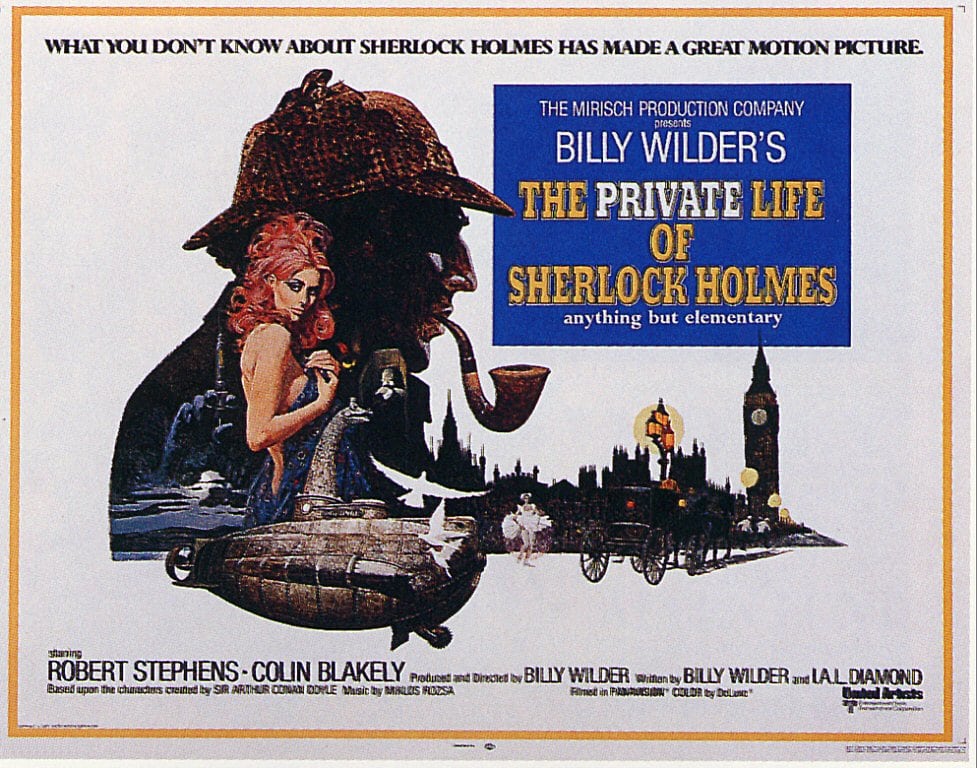   Protest (1967) : 8/10 The Private Life of Sherlock Holmes (1970) : 7/10 Estate Violenta / Violent Summer (1959) : 8/10 49th Parallel (1941) : 8/10 |
|
|
|
Post by morrisondylanfan on Jul 7, 2019 17:47:07 GMT
Hi all,I hope everyone is having a good weekend,and after a delay,I finally viewed: 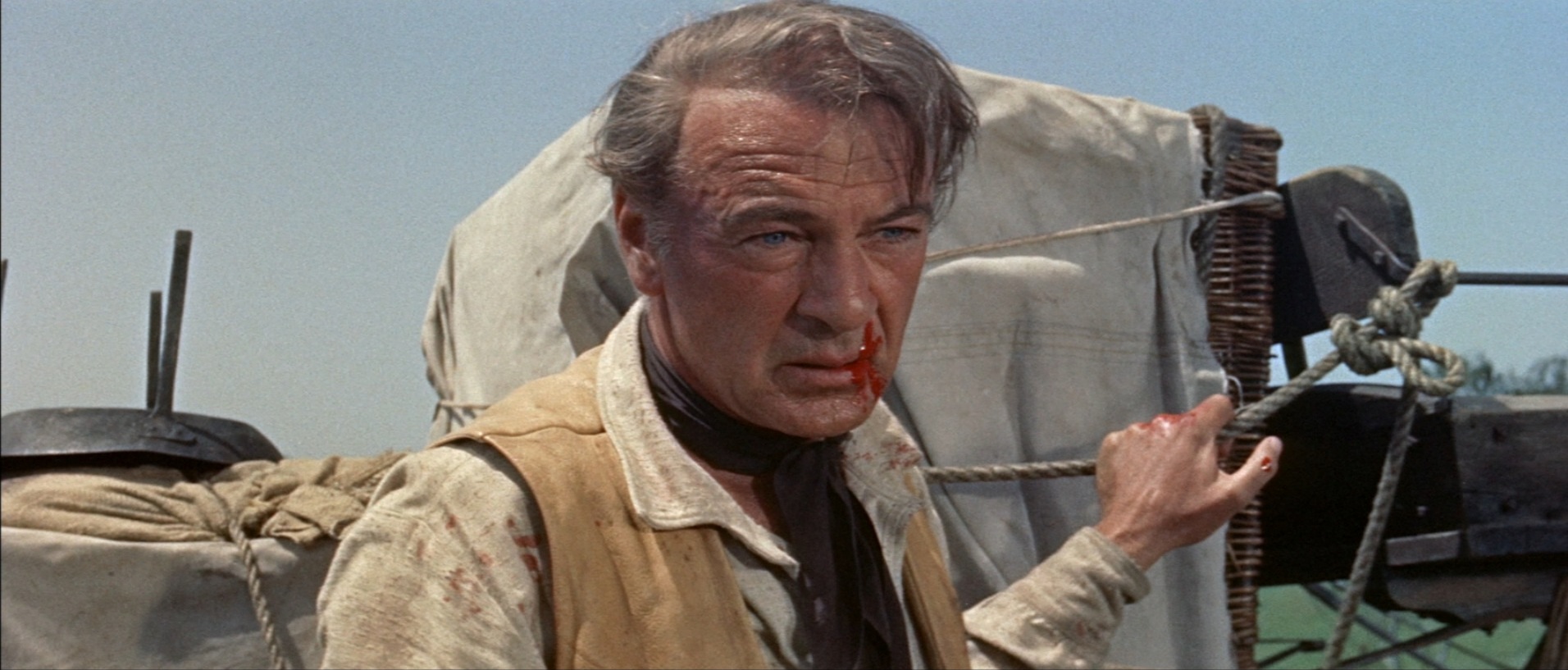 Man of the West (1958) 10 "There's a point where you either grow up and become a human being or you rot, like that bunch." Including a booklet with detailed essays on the title,such as Jean-Luc Godard's "Supermann",and new extras such as a informative audio commentary, Masters of Cinema present a masterful transfer,with the image being pristine and the soundtrack being clean. Returning to the Wild West with a different outlaw, directing auteur Anthony Mann & his regular cinematographer Ernest Haller continue their razor-sharp de-constructing, frontier-pushing examination of the genre, vividly bursting to life in Mann's sparse use of blood putting Link on a knife edge, and the red bullet wounds making each shot land with a thump. Contrasting the visceral with the poetic, Mann and Haller continue to build on their visual theme of the left and right corners of the frame being stylishly gripped by the threats towards Link and Billie pushing them to the corners of being on the wrong tracks. Bringing Link back to his old friends, Mann lassos them with a rich brooding atmosphere of pastel colours and fading blue skies on Noir-like loner Link having to confront the past he had left behind. From the framing of Link in the corner of the screen in his intro, Mann displays a outstanding creativity in the subtle stylisation of shots, as Mann breaths in Link's regrets with long-held medium wide-shots, being cut by Mann's lateral tracking shots firing at the menacing state of the gang,with the anxiety wrapped around Link. Largely working in TV before he adapted Will C. Brown's novel, the compact nature of TV is one that Reginald Rose makes a perfect fit for the lean movie, where Rose slices the excellent dialogue with a thoughtful maturity of uncovering another layer of Link, leading to a enticing play against traditions, ( such as Link and Billie liking each other,but not being passionately in love) and a tangible grit to the outlaws forcing Link to watch them order Billie to undress,matched by them expressing a harsh bitterness over Link leaving their side. Accepting a role which led to James Stewart never speaking to Mann again after missing out,Gary Cooper gives a haunting performance, weighed with a gravitas on his shoulders and a enticing Billie, (a terrific, vulnerable Julie London) Cooper holds Link's head high as he fights pain, sorrow and regret until he leaves himself in the wilderness,as the man of the west.  Delicate Skilful Fingers 1972 8 Pickpocketing characters who would have been on the wrong side of the tracks in Nikkatsu Noir from a decade earlier, the screenplay by co-writer/(with Tatsumi Kumashiro) director Toru Murakawa slots them all into the Roman Porno genre with ease,via loner Yuki becoming entangled with each two-bit thief on the street, whilst the cops look over her shoulders as Yuki learns the moves of thrives. Told "The ceremony is over" (classy!) the writers neatly blend the skin flick antics with the Noir/crime thrills via Yuki's loss of innocence also leading to a loss of any doubt on staying in the petty underworld. Appearing to be illegally filmed outdoors, (the odd passing member of the public looks into camera) director Murakawa & cinematographer Shinsaku Himeda brush a Pop-Art shine on the flick with rapid whip-pans, reflecting pans along windows reflecting Yuki's view,and closely-held hand-held tracking shots following the pickpocketing in the middle of a bustling city. Whilst offering all the naked Yuki you could want, Murakawa displays a subtle touch to the sex scenes, going from dark shadows and lingering close-ups on Yuki's face, to glossy, glamour showcases for Yuki's love of crime and Taku. Joined by Ichiro Araki as the swaggering with dark glasses, street-smart Taku, Hiroko Isayama gives a terrific turn as Yuki, thanks to Isayama pulling at Yuki's anxieties until they snap to Yuki's embrace of Taku and crime with her delicate skilful fingers. 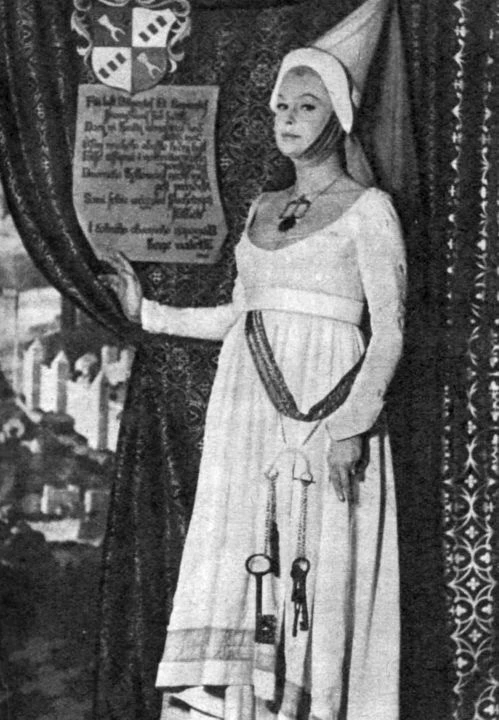 Bílá paní (1965) 8 Inspired by the real Czech Folk tale the Perchta of Rozemberk, director Zdenek Podskalsky & cinematographer Frantisek Valert bring a kitsch Bewitched atmosphere to the glowing appearances of The White Lady,who casts spells, (which includes a funny gag involving freezing someone else in her painting) to improve the shortcomings in the economy and society of 1960's Czech, with stop/start camera pauses, and ghostly overlapped images tracking The White Lady walking through walls. Following The White Lady by keeping the film in a whimsical mood,Podskalsky picks up a satirical wand to burst the self-importance of the local Communist/Government in stylish, imposing upwards wide-shots on the locals in charge making grand, vapid speeches trying to come up with explanations for The White Lady. Framing The White Lady as a unexplainable supernatural being, the screenplay by Karel Michal brilliantly takes the light fantasy and paints it with funny satirical flourishes brushed from the local Commie party attempting to place the "miracles" of White Lady into their designated, micro-managed boxes. While taking digs at the local bureaucracy,Michal refreshingly avoids a bitterness in the comedic tone, (the film later got banned from being shown during the Soviet Occupation) instead going for warm,folk-flavoured mishaps, as the local government ( which includes a hilarious Rudolf Hrusinsky as puffed-up predseda MNV) fumble to offer rational explanations for the improvements made by The White Lady. |
|
|
|
Post by hitchcockthelegend on Jul 7, 2019 20:41:35 GMT
Nora Prentiss (1947) - www.imdb.com/title/tt0039666/referenceThe Man Who Died Twice.Nora Prentiss is directed by Vincent Sherman and collectively written by N. Richard Nash, Paul Webster and Jack Sobell. It stars Kent Smith, Ann Sheridan, Bruce Bennett, Robert Alda and Rosemary DeCamp. Music is by Franz Waxman and cinematography by James Wong Howe. Dr. Richard Talbot (Smith) is fed up of his dull family life. So when pretty nightclub singer Nora Prentiss (Sheridan) calls on him for treatment to a minor injury - his head - and his life - is turned drastically. What did he do? What was he hiding? One of film noir's devilish delights is that of a filmic entry that finds a protagonist in a fantastical situation. Think of Dark Passage where Bogart has plastic surgery to alter his looks, or The Big Clock which sees Milland investigating himself for a crime! The suitcase/cannister plot devices of Kiss Me Deadly and City of Fear, the identity swap madness of Hollow Triumph, and on it goes, the more bonkers the plot scenario is in noir, the more fun the enjoyment can be. And so enter Nora Prentiss, often tagged a woman's melodrama, it's most assuredly a crafty piece of noirville that hinges on a quite superb and fantastical twist of fate come the final stretch. Sure there's melodrama and some romantic delirium, but this is not cosy stuff, the pay offs beat a true pin cushioned heart. The title may be Nora Prentiss, but she's not the key character, Doctor Talbot is, so really it's a name grab title to aid Sheridan in her efforts to break out of a lull (47 also saw her make The Unfaithful - also under the watchful gaze of Sherman). The story trajectory actually isn't what you would perceive as true film noir on plot terms, in that Nora isn't a femme fatale. In fact we are on her side, she's not malicious or shredding Talbot's life by choice, she is actually the one being messed around by the doofus doctor. Talbot is inconsiderate of his actions to how they affect those he so readily leaves behind (wife and two kids), and he lacks a spine to at least do the right thing as he plots a new life with the sultry Nora. And thus he makes a decision - when an opportunity arises in his medical office - that's brilliant in how it shifts the course of the picture into far darker territories. Tech credits are high end, there's absolutely nothing wrong in the wily Sherman's direction, where although I can't personally say all his noir ventures are successful, he handles the tonal shifts smartly here whilst getting top perfs from his leads. Sheridan and Smith are done proud by the writers, they get interesting characters to play who are caught in a web of passion, unfulfillments, paranoia and a stonker of a lie. While as ace composer Waxman drifts tonal harmonies over proceedings, Sheridan even gets to warble a couple of very pleasing tunes. Yet all play second fiddle - not for the first time for many others - to Wong Howe's photography. A master of low-key compositions, he blends the expressionist feels with claustrophobic visual tightness. Witness the scenes in the hotel room that Nora and Richard share, a sequence post an operation that's filmed in clinical shadowed low lights, and the metaphorically potent scene of Nora and Richard talking through a prison grille. A hit at the box office, the realignment of Sheridan's career in place, Nora Prentiss has many reasons for being sought out for viewing pleasures. More so if you like to tread the dark and sometimes nutty sidewalks of noirville. 8/10 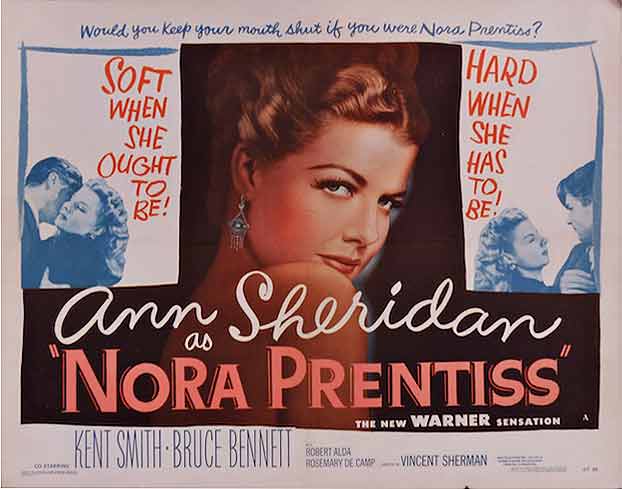     Gun the Man Down (1956) Gun the Man Down (1956) - www.imdb.com/title/tt0049286/reference Remington Steel!Gun the Man Down is directed by Andrew McLaglen and adapted to screenplay by Burt Kennedy from a story written by Sam Freedle. It stars James Arness, Angie Dickinson, Emile Meyer, Robert J. Wilke, Harry Carey Jr, Don Megowan and Michael Emmet. Music is by Henry Vars and cinematography by William H. Clothier. Three outlaws rob a bank and during the escape one of them, Rem Anderson (Arness), is badly wounded. His two partners kidnap his girlfriend, take his share of the loot and leave him to be captured by the closing in posse. After serving a year in jail, Rem gets out and has only one thing on his mind, to locate his double-crossing partners in crime and enact sweet revenge on them... It's a notable Western for a number of reasons, it was Angie Dickinson's first credited starring role, it was the first film directed by Andrew McLaglen (son of Victor), and it was to be Arness' last credited feature film before embarking on a 27 year TV career. In plot terms we are very much in familiar "B" Western territory, it's the story of a bad man who has good at his core but is driven on by a need for revenge. After the initial robbery and desertion of cohorts, we then follow Rem out of prison and onto a small tin-pot town where he knows those who done him wrong are situated. Pic then focuses on what Rem will do? Will he get revenge and end up back in jail? Will he make up with his one time love, Janice (Dickinson), who we find out is now the lover of his nemesis, Matt Rankin (Wilke)? Into the mix comes a couple of strands that sees Rem having to justify his being in town to the local law enforcers (Meyer the sheriff - Carey Jr. the deputy) - so promptly not giving the law reason to lock him up, and of course to stay alive since some factions want him dead ASAP! These factors bring out a rich characterisation for Anderson, he has to use his wits as much as he does his pistol. The sheriff and deputy relationship is very warm, very father and son like, and their sensing of Rem being a good man behind his motives gives the simple story some sure footed foundations to work from. Running a short 76 minutes, pic is very traditional Western fare, and it doesn't quite have enough good material to actually be this long in length - McLaglen working with tight budget pads out some scenes to reach the time slotted target. In fact, the budget restrictions are never more evident than in the town itself, which is strangely devoid of people, this even though the sheriff keeps telling us that Rankin's saloon has been a hive of undesirables! So, an allowance and understanding of the "B" Western drawbacks will definitely aid the likeminded adults viewing experience. Though not high on action quotas, pic gets by on tense scenarios and character interactions, notably when Janice is involved. It's a nicely written character, with twin confliction of head and heart and suitors of varying degrees. She is also the centre piece for a dramatic turn of events that lifts this still further away from being a "run of the mill" cheapo Oater. There's some nice location photography on show (Woodland Hills - Calif), a couple of niftily shot scenes involving shadow play and one with Rem and a full length mirror, and the finale - like the cast performing for us - is very agreeable. Not a must see movie of course, but for fans of the genre it holds enough about it to keep you entertained. 6/10       The Halliday Brand (1957) The Halliday Brand (1957) - www.imdb.com/title/tt0050481/referenceThe Halliday Brand is directed by Joseph Lewis and written by George W. George and George F. Slavin. It stars Joseph Cotton, Ward Bond, Betsy Blair, Bill Williams, Viveca Lindfors, Jay C. Flippen, Christopher Dark and Jeannette Nolan. Music is by Stanley Wilson and cinematography by Ray Rennahan.
The Halliday family is presided over by patriarch Big Dan (Bond). Dan is a bigot and rules the roost with an iron fist – he’s also the town sheriff! When he finds his daughter, Martha (Blair), is in a relationship with half-breed Jivaro Burris (Dark), he is enraged and it kicks off a series of events that forces the eldest son, Daniel (Cotton), to become rouge to his father’s ways.
He can’t protect his own property, how’s he going to protect yours? Get a new sheriff or you’re next.
It’s a little strange to think that a film directed by auteur Joseph H. Lewis, one that gets runs on TCM, and is a Western at that, is still in this day and age crying out for some attention. The low volume of reviews written on line for it – both professional and amateur – further emphasises that it is little seen and sadly forgotten. Which for genre fans, and in particular those who like some psychological barbs in their narratives, is a damn shame.
We are firmly in the realm of the Oedipal and the Freudian, where the pic cross examines the effects that a tyrannical patriarch has on his children. Violence as a solution is one of his mantras, as is racism, Big Dan Halliday firmly believes that anyone who is not with him, and takes his beliefs as sacrosanct, is therefore against him. When his eldest son is jolted into rebellion, it spells trouble for not only the Halliday family across the board, but also the townsfolk who come under the domineering wing of Sheriff Big Dan.
It would be churlish of me to even try and gloss over the bizarre casting decisions, for they alone to my mind stop this film from being part of the top table sitters for similar genre pieces. Cotton playing Bond’s son is ridiculous, even with Bond in old man make up and wiggery, Cotton still looks too old to play his son. Lindfors doesn’t fare much better as a half-breed, neither does Nolan as a full blood American Indian, and yet (it should be noted that Dark convinces as Jivaro) the perfs are all actually ok, fronted by a “perfectly” cast Bond (never one to mince his words or be outspoken was Ward!).
At the helm is Lewis, a director who over the decades has come to be regarded as a major talent that was under appreciated in his own time. The likes of Scorsese have led the way with glowing praise, enticing film fans to seek out some of his work and be spellbound by the likes of Gun Crazy and The Big Combo, and enchanted by My Name is Julia Ross, and admire the off kilter daring of Terror in a Texas Town. Here he once again makes a silk purse out of a sow’s ass, his ability to make a cheap film look expensive is quite something to observe, infusing scenes with either the ethereal or some metaphorical smarts. A top talent that just like The Halliday Brand itself, is well worth discovering. 8/10
   .jpg)  
Adiós, Sabata (1970) - www.imdb.com/title/tt0066745/reference
Adiós Sabata, Hello Maximilian The First!
Adiós, Sabata is directed by Gianfranco Parolini (AKA: Frank Kramer) and Parolini co-writes the screenplay with Renato Izzo. It stars Yul Brynner, Dean Reed, Ignazio Spalla, Gerard Herter, Pedro Sanchez, Joseph Persaud, Salvatore Borgese and Susan Scott. Music is by Bruno Nicolai and the Technicolor/Techniscope cinematography is by Sandro Mancori.
The second of what would eventually be known as The Sabata Trilogy, we here have Brynner stepping into the shoes previously worn by Van Cleef. We are in Mexico under the self imposed rule of Emperor Maximilian I, and Sabata is hired by guerrilla leader Señor Ocaño to steal a wagonload of gold from the Austrian army. Unfortunately the gold has already been appropriated by Colonel Skimmel and so Sabata and his dubious cohorts set about stealing the gold back.
This has all the good and bad hallmarks of Spaghetti Western film making, the action is outrageously entertaining, the weaponry and methods of death and destruction are enterprising, and the lead man is cool and quippy. Conversely it's all very absurd and the plot is wafer thin - but Spaghetti Western fans kind of embrace these as virtues and have a good time if the film isn't insulting one's expectation levels. There's a less comedic tone running through this one than that of the first picture, helped by Brynner's machismo fronted bad boy act. The comedy that is here sits safe within the fruity period set-up, and even as acrobat stunts in battle seem oddly at war with the greed and power hungry thematics pulsing away, it's easy to just sit in tight and go with the flow.
In the mix we have a toy model ship that actually fires killer ammunition, Sabata's awesome sawed off side loading lever action rifle (with a chamber for Sabata's cigar as well), and a man who flings ball bearings with his feet!! Sabata can also play a killer tune on the piano, as can his dubious ally, Ballantine (Reed). There's the usual Spaghetti trait of vibrant camera workings on offer, likewise the musical accompaniments, and it all builds to a ferocious battle (stunt men earning their keep for sure) and chase finale that has a tongue in cheek charm about it. It's probably not one that even the hardcore sub-genre fans would revisit often, but while it's playing it holds the attention and entertains accordingly. 6.5/10
  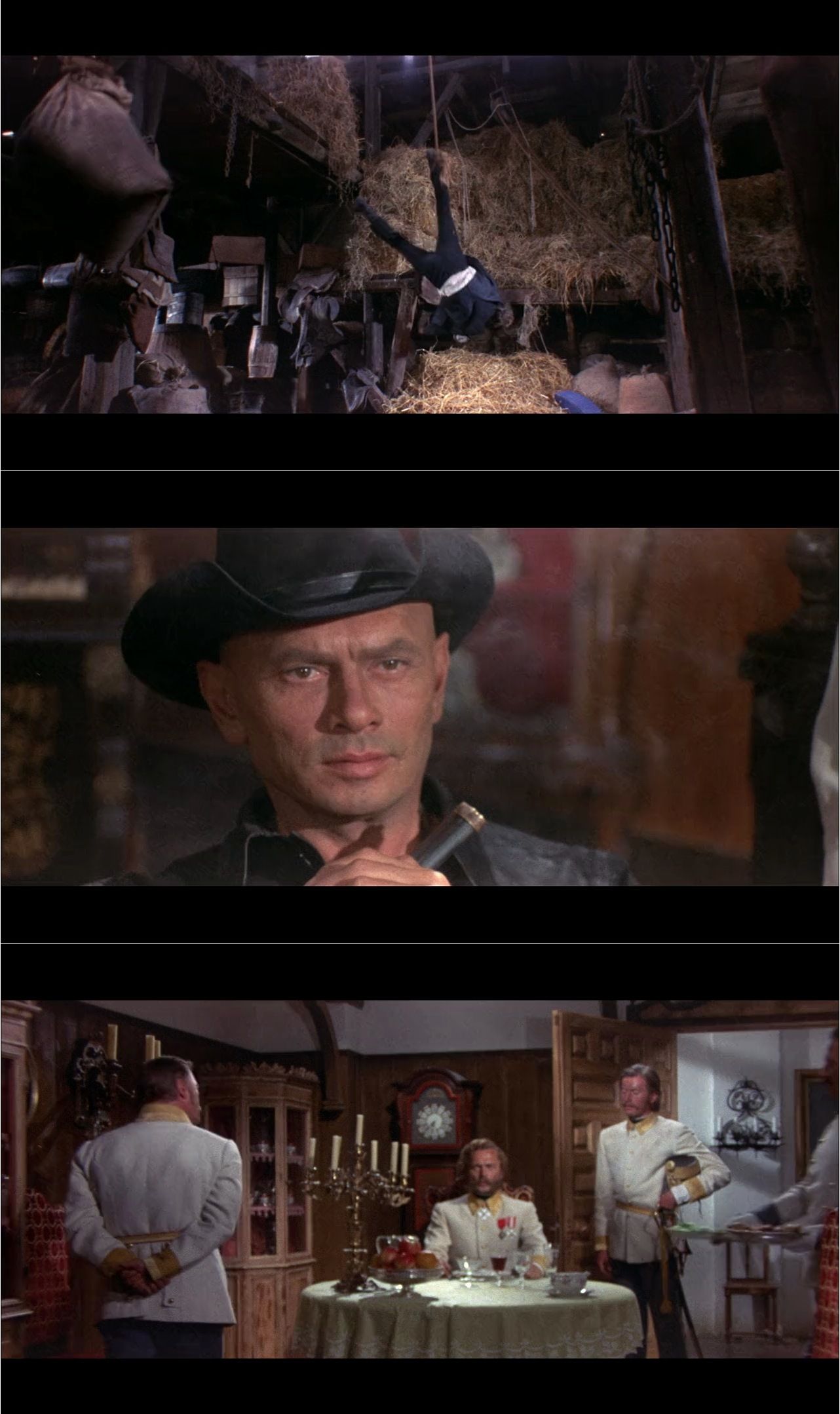   
Simpatico (1999) - www.imdb.com/title/tt0174204/reference
Infertiile Neo-Noir?
Simpatico is directed by Matthew Warchus and Warchus co-adapts the screenplay with David Nicholls from the play written by Sam Shepard. It stars Nick Nolte, Jeff Bridges, Sharon Stone, Catharine Keener and Albert Finney. Music is by Stewart Copeland and cinematography is by John Toll.
Three young confidence tricksters have orchestrated a horse racing scam tat is making them big money. However, when the scam is unearthed by a top official they set him up for blackmail and make off into the sun. Twenty years later the three of them are brought together by circumstance and the time of emotional reckoning...
It was met with disdain by critics and film goers alike, and even now some 20 years after it was first released it holds below average ratings on the main internet film sites. Is this fair? Does it at the least deserve to be revisited and re-evaluated on its neo-noir character driven terms? Well sort of...
Off the bat it deserves better scores than those afforded it on line purely for the acting alone, this is a high grade group of actors breathing life into damaged characters. Very much a talky character driven piece (stage origins boom out from the off), the screenplay does have a deft potency about it, dealing as it does about shame and guilt and the foundation of success built out of financial gain, with the kicker being the long term repercussions of youthful criminality. Dialogue is often sparky (helps being delivered by those fine actors of course), Toll's cinematography around the Kentucky locales is beautiful, and come the final resolutions to the main characters journey we get a huge emotionally metaphorical whack.
However, there's an overuse of the flashback structure to show us the principals in their younger scamming - life altering - days (played by Kimberly Williams-Paisley, Shawn Hatosy and Liam Waite). Annoyingly there's also the puzzling question hanging over the play as to if this is a simple life story of errors never mended - of cheats prospering only to fall at the later in life hurdle? Or is this attempting to be a complex study of the human condition? Maybe even giving us a stark warning, a message piece if you will. Of course, maybe that's Shepard's thing? to not have definite answers? Either way it's a little frustrating to not have an absolute with such a strong character piece.
It's hardly a must see recommended picture, that's for sure, in fact Warchus' first time direction away from the actors is uncomfortably staid. Yet there's some nice craft here, and a tantalising "more than meets the eye" question mark that keeps you interested if you be so inclined to stick with it. Infertile or interesting? You decide. 6/10
  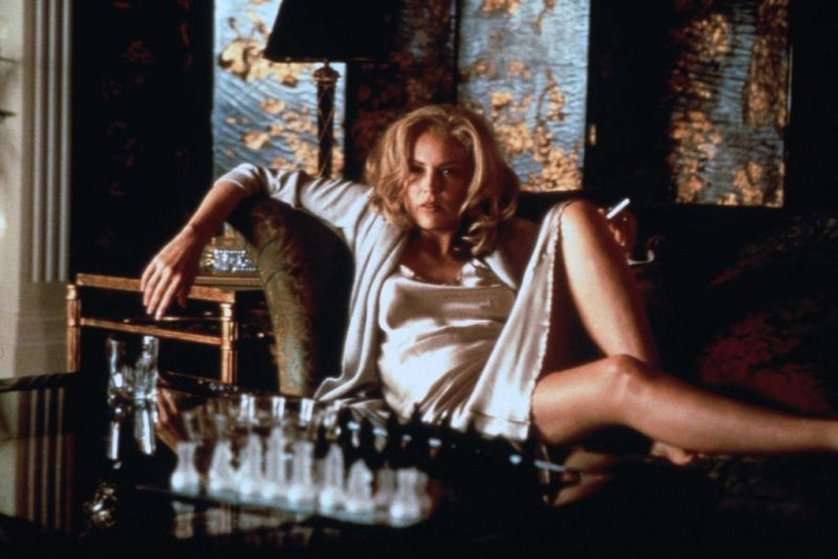  
I did also watch Superman II - The Richard Donner Cut. Will be watching both cuts this week before reviewing as I want to see them back to back. I like it quite a bit though, but I already liked the Richard Lester version anyway. I'll see...
TV - Just the one this week >
The Outer Limits (1963–1965) - I, Robot (1964)
The Trial of Adam Link
I, Robot is directed by Leon Benson and adapted to screenplay by Robert C. Dennis from the story written by Eando Binder. It stars Howard da Silva, Ford Rainey, Marianna Hill and Leonard Nimoy. Music is by Harry Lubin and cinematography by Kenneth Peach.
Season 2 - Episode 9
Originally a very short story in Amazing Stories, it would influence Isaac Asimov and in turn see a big screen blockbuster released in 2004. Plot sees a robot named Adam Link on trial for the murder of his creator. Defence attorney Thurman Cutler (da Silva) comes out of retirement to not only try and prove Link is innocent, but to put on trial the workings of a machine in a human world, and that of the human condition of acceptance, growing and learning one self.
A super episode, one of the better entries in series 2, the messages it gives remain pertinent as ever, the court case with its legal wrangling's holds strong interest, and the finale is socko - with the closing narration striking a mighty chord. 9/10
 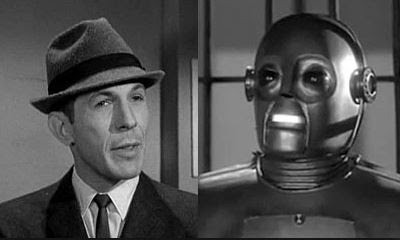   
Done!
|
|
|
|
Post by Lebowskidoo 🦞 on Jul 8, 2019 19:42:05 GMT
|
|
|
|
Post by mikef6 on Jul 8, 2019 21:03:55 GMT
hitchcockthelegendI greatly enjoyed your review of "Nora Prentiss" and was happy that you liked it as much as I did. It really is a roller coaster ride and raises so many questions. Was the sex with Nora really so good that Talbot could so easily walk away from the daughter that needed his attention and approval so much? The daughter just disappears from the movie. When he was on trial and his wife was asked if she had even seen the defendant before, she looks at him closely, hesitates, then says "no." There is a cut to Talbot and we see him smile. Did she recognize him but realize what exposing him would cost? And as one of the lobby posters asks, 
|
|
|
|
Post by hitchcockthelegend on Jul 8, 2019 21:23:47 GMT
Emperor of the North Pole. Quality. Nobody gets a free ride on this train!It's the great depression and the US is now home to many homeless hobos. Shack is a particularly nasty piece of work, devoid of any compassion for the homeless, he prides himself on not letting any one ride free aboard the train he conducts upon. But in the midst is hobo supreme, A No. 1, a man who is never afraid to take up a challenge, so along with Cigaret, a young wannabe legend, he sets about destroying Shack's reputation whilst furthering his own. Make no bones about it, Emperor Of The North Pole is unashamedly macho, director Robert Aldrich filling his picture with machismo beefcakes and molding a story of brawn versus brawn aboard the unlikely setting of a steam train journey. Boasting Lee Marvin and Ernest Borgnine (both excellent) as the twin main leads signals the films intent, yet the picture offers more than just egotistical bluster. We get a very engrossing feel of a most depressing time in history, a time when men wanted to be men but were struck down by misfortune. Some of the dialogue is very sharp, listen to Marvin's A No. 1's wry observations on the world and you know that this film has quite a bit to say. The other major thing to note is that some of the technical work is brilliant, the photography from Joseph F. Biroc is priceless, and some of the train sequences are feasts for the eyes. Aldrich's undervalued flair for action also comes to the fore here, from a near miss train crash to the defining confrontation between our two pit bull protagonists, it really is a most accomplished piece across the board. Even young Keith Carradine as Cigaret comes out with much credit, it would have been easy for him to have been lost under the sheer weight of the beef talent around him, but he holds his own and is integral to the picture's ultimate success. It's a difficult one to recommend with any great confidence because it has kind of got an acquired taste to it, but to me it remains one of the 70s hidden treasures. Simply put it's a film that I'm always going to have the utmost regard for. 9/10 Alien³ . It's a ridiculously bold boasting poster is that! I stand by my review - always!  Don't feck with The Baldies!Special Edition. Don't feck with The Baldies!Special Edition.I love it, I really do. OK! So it's basically a monster on the loose piece, but the setting at a sci-fi prison colony - complete with nutty religious shards - makes for a thrillingly atmospheric ride. Of course if this was merely a stand alone film, where there was no Alien and Aliens previously, I feel sure the special edition cut would be thought of differently. A roll call of Brit thesps line up for some tension filled entertainment as director David Fincher and cinematographer Alex Thomson provide a look that is both beautiful and scary. The metallic nightmare of chambers and cold concrete fused together for some hellish stalk and paranoia. Industrial Punk? Steam Punk? Cyber Punk? Fincher Punk? Hey man, we gotta give it a name! And of course there's Siggy Weaver front and centre, the reassuring presence among the murderers, rapists and child molesters. I could live without the attempt at a transcendent finale, but in extended form this has much to light your fires. It also showed that Fincher would be a director to watch - imagine if had he been left alone to craft his own vision? His subsequent career and standing makes a mockery of the studio execs involved in the making of Alien³. 8/10
|
|
|
|
Post by hitchcockthelegend on Jul 8, 2019 21:36:22 GMT
 Battle Beneath the Earth (1967) One of the sillier films I've seen in awhile, the film definitely reminds me of those films that used to regularly play on Saturday mornings on the local UHF stations back in the '80s (probably '70s too but I was too young to remember that). Apparently a rogue band of Communist Chinese soldiers have invented a laser boring machine that is capable of tunneling quickly and easily through the earth's crust and has managed to make its way under the Pacific Ocean to the United States to plant atomic weapons under key American cities. A scientist has been studying underground vibrations that weren't typical mine operations and is arrested by the local Las Vegas police for disturbing the police (the film opens with him making a scene near all the casinos by keeping his ear to the ground and yelling loudly "they are under us already, these ants!" He ends up in the local mental asylum but is friends with Kerwin Mathews who works for US Naval Intelligence. Apparently the military has been dealing with some odd coincidences of seismic disturbances and Mathews had been the lead on a naval project with deep sea submersibles, one of which was destroyed by falling underwater rocks caused by seismic activity. The activities by the Chinese draw attention to an old abandoned mine which Mathews is tasked with investigation and an odd Chinese medallion is found along with a passage underground that is too perfectly cut to have been done by conventional methods. Eventually the Chinese are discovered and the scientist that was arrested at the beginning is tasked by the US government to develop a way to detect where all the Chinese boring activities are occurring and also to develop a laser boring machine as well to find the main passage to the single tunnel that the Chinese dug that runs under the Pacific Ocean. Mathews leads another team (after having disarmed quite a few of the atomic bombs) including a beautiful local geologist (who doesn't know not to step on hot molten rocks) to locate the main passage and after some Chinese induced hypnotism and most of his team getting killed manage to destroy most of the Chinese forces underground and set off an atomic bomb that destroys the passage and ends the threat to the US. The film ends with a nuclear blast going off in the distance and Kerwin Mathews and the beautiful geologist sitting outside of a cave entrance viewing the blast. A silly film, but the story is fun enough and the acting played so straight that it's worth a late night view. . Can't believe I have never seen this one, I do have a kink for these silly sci-fi cheese sandwiches - prefer them to have strange creatures in them though  I'll stick it on my radar. I presume you got the WB Double Pack to watch this and the Brynner?
|
|